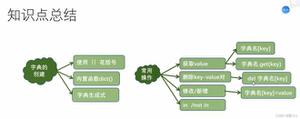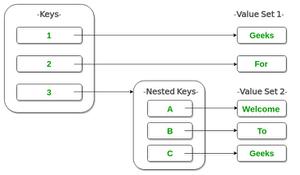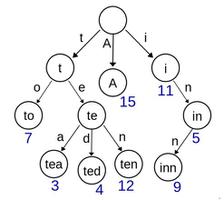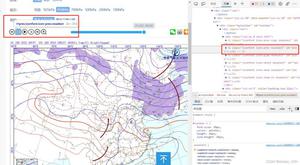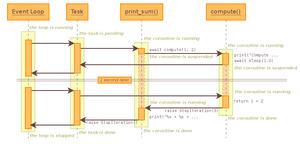python遍历n叉树
传入参数为一个二层嵌套list(例:[[1,2],['a','b','c'],['!','@'],[...]]),list[0]为第一层节点,list[1]为第二层节点,依此类推。
要求:设计一个函数,return该n叉树所有的路径。
例子中的list就是return[
[1,'a','!'],
[1,'a','@'],
[1,'b','!'],
[1,'b','@'],
[1,'c','!'],
[1,'c','@'],
[2,'a','!'],
[2,'a','@'],
[2,'b','!'],
[2,'b','@'],
[2,'c','!'],
[2,'c','@']]
如下图所示:
回答:
这个并不是树的遍历,这就是一个简单穷举的问题,第一个位置可能是1或2,第二个可能是a,b或c,以此类推。
def enumerateAll(levels): if len(levels) is 1:
yield from map(lambda e: [ e ], levels[0])
else:
head = levels[0]
tail = levels[1:]
for h in head:
for t in enumerateAll(tail):
yield [ h ] + t
list(enumerateAll([ [ 1, 2 ], [ 'a', 'b', 'c' ], [ '!', '@' ] ]))
应该有更简洁的写法,暂时不想想了
回答:
一时短路差点忘了笛卡尔乘积,最简单,两行代码。
python">from itertools import product[list(i) for i in product(*tree)]
-------------------update ----------------------
我有一个使用reduce的写法,只是不知道是否好理解
python3">from functools import reducetree = [[1,2],['a','b','c'],['!','@']]
tmp_tree = [[[]]] + tree
def step(x, y):
return [i + [j] for i in x for j in y]
reduce(step, tmp_tree)
tmp_tree 是为了方便reduce同构迭代,当然你也可以这样写
from functools import reducetree = [[1,2],['a','b','c'],['!','@']]
def step(x, y):
return [i + [j] if isinstance(i, list) else [i, j] for i in x for j in y]
reduce(step, tree)
以上是 python遍历n叉树 的全部内容, 来源链接: utcz.com/a/158793.html

